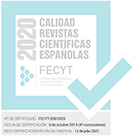Ethnobotanical study of medicinal plants from El-Jadida City (Morocco)
Abstract
In the framework of the ethnobotanical studies on medicinal plants undertaken by the Laboratory of Biodiversity and Natural Resources of the Faculty of Sciences of Kenitra (Morocco), we are interested in the area of El-Jadida which presents a rather important floristic wealth due to the variations of the ecological conditions. By using 204 questionnaires, the ethnobotanical surveys were conducted in the field during the years 2012-2013. The location of the different sampling sites was determined by the stratified sampling method. The analysis of the results obtained from the questionnaires allowed us to identify 70 species belonging 69 genera and 37 families, the most important by its number of species are: Lamiaceae, Apiaceae, Asteraceae, Zingiberaceae, Fabaceae and Myrtaceae. The species Origanum compactum is the most used by the population of the city of El-Jadida. The relations existing between the medicinal species and types of diseases treated, has shown that most of these species are used primarily in the care of the digestive system and respiratory system. These plants are handled mainly by seed which is the plant organ most used and the decoction which is the method of preparation the most dominant among the local population.
Downloads
Article download
License
Lazaroa is an open access journal to promote global exchange knowledge. It facilitates unrestricted access to its contents from the moment of publication in its electronic edition. The originals published are property of the Universidad Complutense and it is mandatory to cite such source in case of total or partial reproduction. All contents are distributed under a Creative Commons License 4.0 (CC BY 4.0). This circumstance must be expressly stated in this way when necessary. You can check the informative version and legal text of the license.
Lazaroa does not charge for download or publishing any article.








